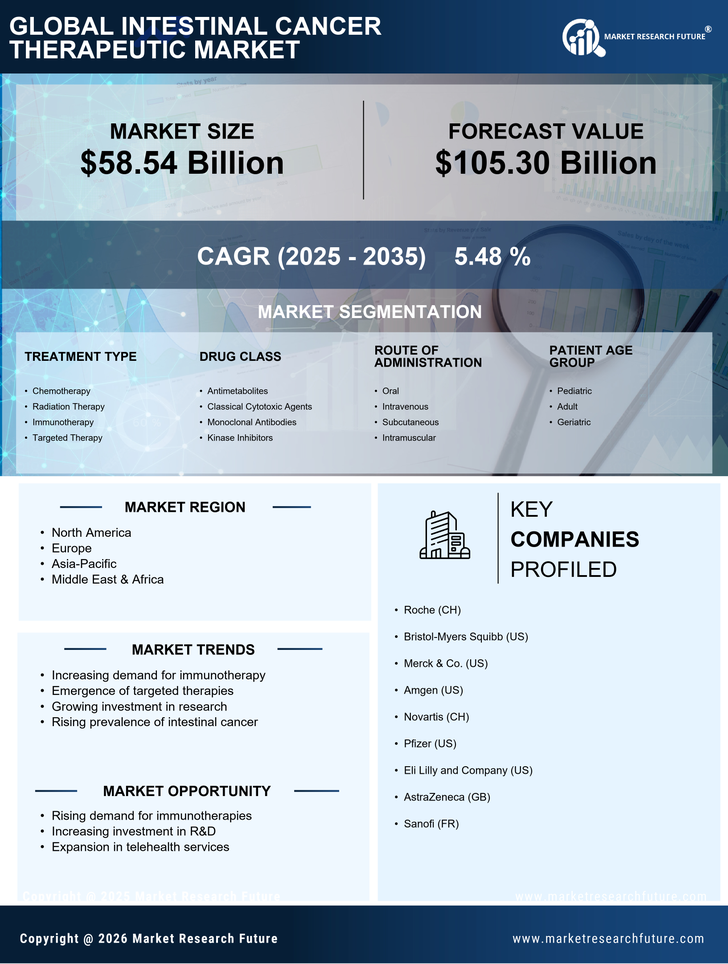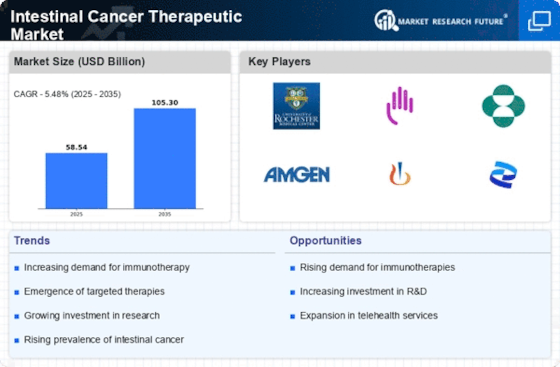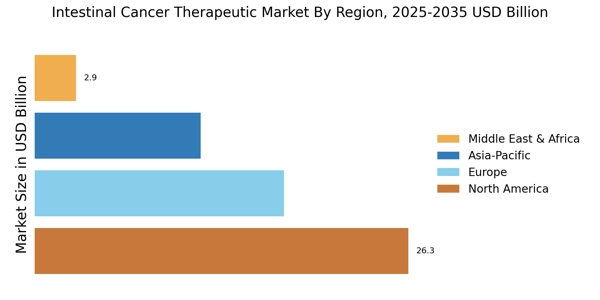Advancements in Precision Medicine
The Intestinal Cancer Therapeutic Market is witnessing a notable shift towards precision medicine, which tailors treatment based on individual genetic profiles. This approach enhances the efficacy of therapies, as it allows for the selection of treatments that are more likely to be effective for specific patient subgroups. Recent data indicates that precision medicine could potentially increase the survival rates for patients with intestinal cancer by up to 30%. As research continues to uncover genetic markers associated with intestinal cancers, the demand for targeted therapies is expected to rise, thereby driving growth in the market. Furthermore, pharmaceutical companies are increasingly investing in the development of personalized treatment regimens, which may lead to a more robust pipeline of innovative therapies in the coming years.
Emergence of Novel Therapeutic Agents
The Intestinal Cancer Therapeutic Market is poised for growth with the emergence of novel therapeutic agents that offer new hope for patients. Recent advancements in biotechnology have led to the development of innovative drugs, including monoclonal antibodies and small molecule inhibitors, which target specific pathways involved in cancer progression. The introduction of these agents has the potential to revolutionize treatment paradigms, providing more effective options for patients with advanced intestinal cancers. Market analysts project that the segment of novel therapies could account for a significant share of the overall market, driven by their ability to improve survival rates and quality of life. As research continues to unveil new targets for therapy, the market is likely to expand further, offering a diverse array of treatment choices.
Rising Incidence of Intestinal Cancer
The Intestinal Cancer Therapeutic Market is significantly influenced by the rising incidence of intestinal cancers, which has been steadily increasing over the past decade. According to recent statistics, the incidence rate of colorectal cancer, a major component of intestinal cancer, has risen by approximately 2% annually. This trend is attributed to various factors, including lifestyle changes, dietary habits, and an aging population. As the number of diagnosed cases continues to grow, there is an escalating demand for effective therapeutic options. This surge in patient population is likely to stimulate investments in research and development, leading to the introduction of novel therapies and treatment modalities that cater to the needs of this expanding demographic.
Increased Investment in Cancer Research
The Intestinal Cancer Therapeutic Market is benefiting from increased investment in cancer research, which is crucial for the development of new therapies. Governments and private organizations are allocating substantial funds to support research initiatives aimed at understanding the underlying mechanisms of intestinal cancers. For instance, funding for cancer research has seen a rise of over 15% in recent years, facilitating advancements in drug discovery and clinical trials. This influx of capital is expected to accelerate the development of innovative treatment options, including biologics and combination therapies, which may enhance patient outcomes. As research progresses, the market is likely to witness a proliferation of new therapeutic agents that address unmet medical needs in the treatment of intestinal cancer.
Growing Awareness and Screening Programs
The Intestinal Cancer Therapeutic Market is experiencing growth due to heightened awareness and the implementation of screening programs aimed at early detection of intestinal cancers. Public health campaigns have successfully educated populations about the risks and symptoms associated with these cancers, leading to increased screening rates. Recent data suggests that early detection through screening can reduce mortality rates by up to 68%. As more individuals undergo regular screenings, the number of diagnosed cases is expected to rise, subsequently driving demand for therapeutic interventions. This trend underscores the importance of preventive measures and early treatment, which are likely to shape the future landscape of the intestinal cancer therapeutic market.


















